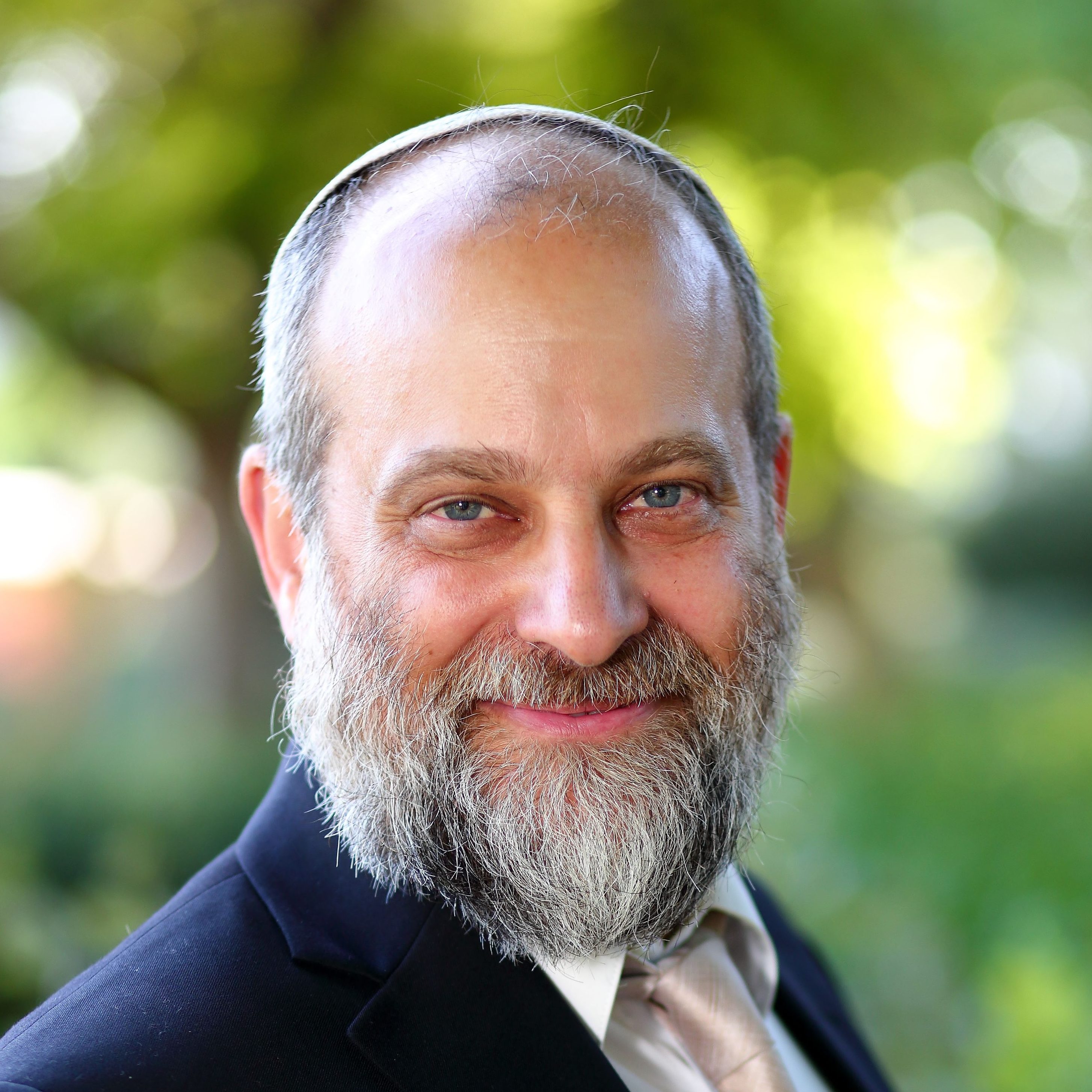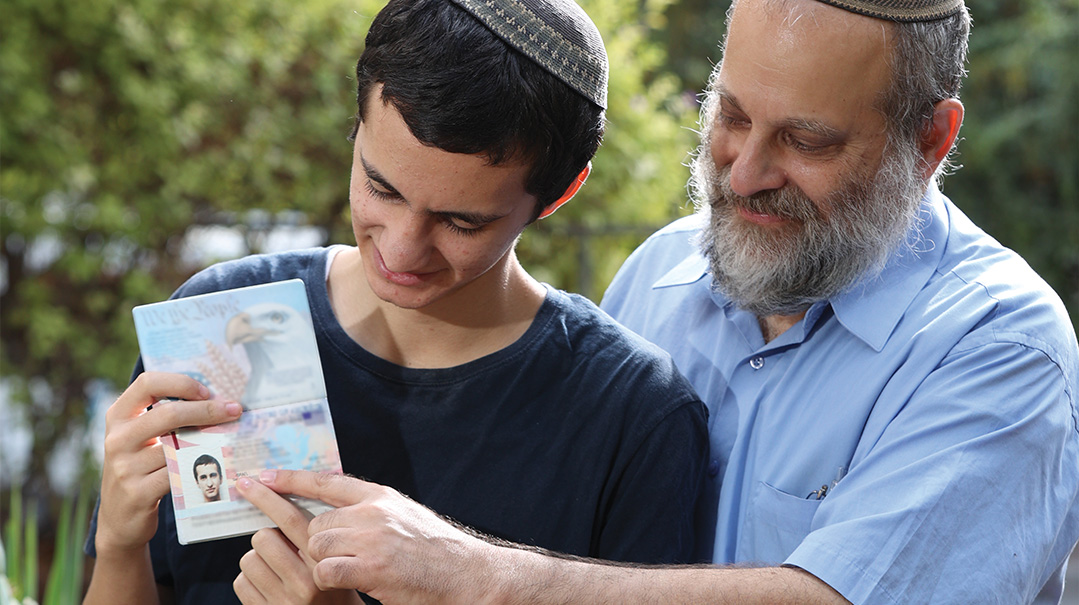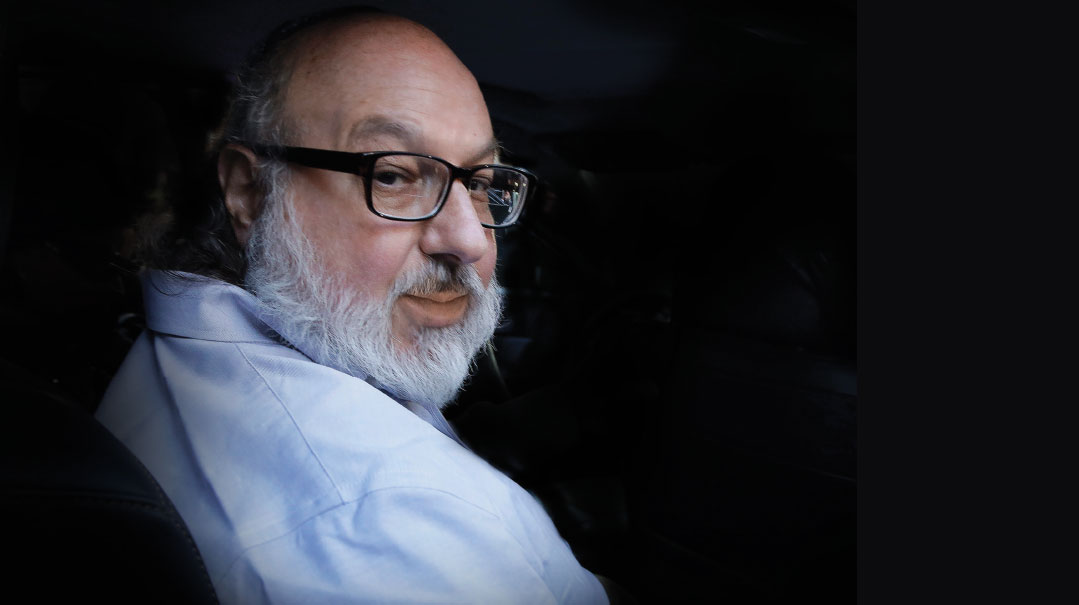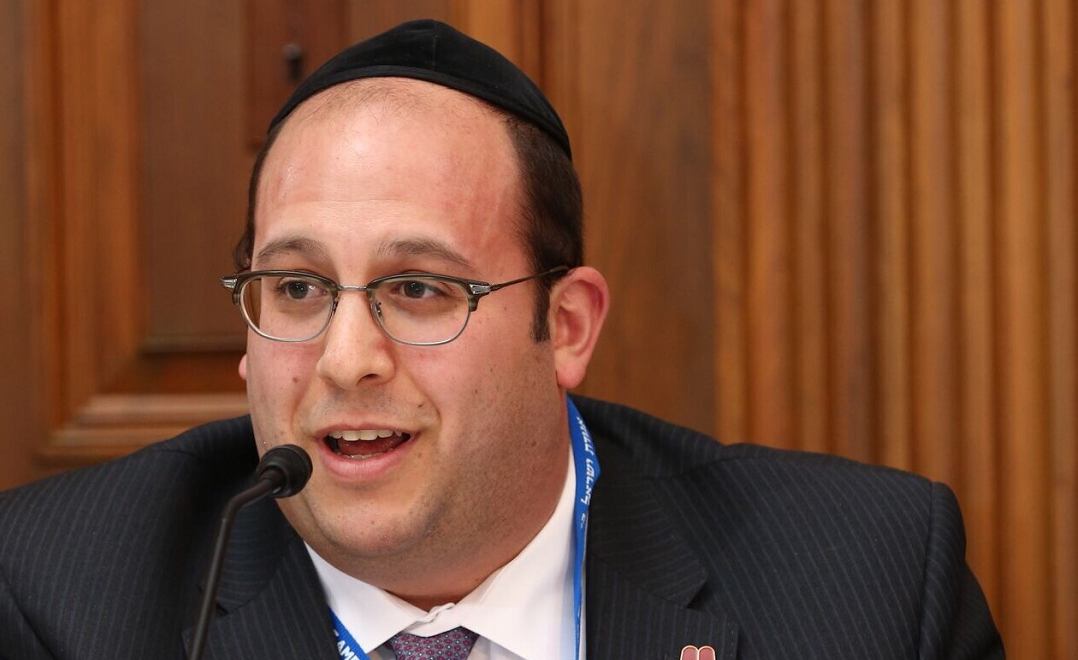Birthright Restored

Ari Zivotofsky’s 18-year battle finally ends with “Israel” listed on his son’s passport

Photos: Eli Cobin, Family archives
When the cover story of the June 10, 2015 Mishpacha declared: “A loss, but not a defeat,” we really still held onto the hope that after the US Supreme Court had ruled against us twice, our Jerusalem-born son Menachem’s passport would some day actually list his place of birth as “Israel.”
But standing on the windy hilltop in the ubiquitous passport application line outside the US Embassy in Jerusalem last week, we couldn’t believe our 18-year saga was finally over. With siyata d’Shmaya and the persistent hard work of some key people — including our indefatigable attorneys of Lewin & Lewin together with members of the Trump administration, particularly Ambassador David Friedman — Menachem, and countless others, will now have a country along with a city to claim as their place of birth.
As many Americans living in Israel know, any American citizen living overseas is at times in need of official US government documents. The three most common are a passport, a consular report of birth abroad (a “birth certificate”) and a consular report of death (a “death certificate”). For the latter two there is a space for “city” and “country” — but for a birth or death in Jerusalem, only Jerusalem was written and the country space was glaringly left blank. For passports too, a US citizen born in Jerusalem had no options but to simply have “Jerusalem” listed as the place of birth, as US policy has always been not to recognize any country as having sovereignty over Jerusalem. In general, passports of those born outside the US only have a space for one word as place of birth, which is supposed to be the country, not the city, of birth.
But in addition to feeling like a slap in the face for all those Jerusalem-born babies, this same policy permits those born anywhere in Israel who oppose Israel’s existence to remove “Israel,” and it also permits individuals born before 1948 to list “Palestine.” What this policy meant is that those who seek Israel’s destruction can “erase” Israel from their passport, but citizens born in Jerusalem who want to include Israel were forbidden from doing so.
It’s an ironic twist that although the United States was the first country to recognize the State of Israel in 1948, the US has never recognized Israel’s sovereignty over Jerusalem. Rather, the US maintained that the status of Jerusalem — including the western section — is in dispute and subject to negotiation. This policy manifests itself in several ways. Until recently, the US Embassy was in Tel Aviv, and while the US maintained a consulate in Jerusalem, the consulate reported directly to the State Department rather than to the embassy in Tel Aviv.
The people of the United States, through their elected officials, were not happy with this policy of Foggy Bottom. In 1995, Congress passed the Jerusalem Embassy Act with overwhelming bipartisan support. That Act directed that the US Embassy to Israel be moved to Jerusalem, but also included a waiver clause by which the president could temporarily delay the move. And delay they did. But when Congress realized that the executive branch was dragging its feet, it passed another Jerusalem-related law. In 2002, Congress passed the Foreign Relations Authorization Act, Fiscal Year 2003 – Public Law No. 107-228, that allowed a US citizen born in Jerusalem to request from the State Department that his birthplace be listed as “Israel” instead of the stateless “Jerusalem.”
Sounds simple and straightforward enough, as Ambassador Friedman pointed out at last Friday’s ceremony, when he handed 18-year-old Menachem a new passport with the country “Israel” finally printed inside.
But from the beginning, that provision faced opposition. President George W. Bush issued a “signing statement” when he signed the Act into law asserting that the provision regarding Jerusalem, “impermissibly interfere[d] with the President’s constitutional authority to formulate the position of the United States, speak for the Nation in international affairs, and determine the terms on which recognition is given to foreign states.” President Bush instructed the Department of State to ignore the directive included in the new law because “US policy regarding Jerusalem has not changed.”
Shortly after this law was passed, Menachem was born — and while we had some vague knowledge of the policy and the new law, we had no idea then how deeply involved and educated we’d become in the issue. At the Tel Aviv embassy we requested that the passport state that Menachem was born in Israel. The clerk definitively and derisively informed us that despite what the new law said, that was not possible, and that in conforming with America’s longstanding policy, the passport would state only “Jerusalem.” While being very proud of the fact that our child was born in Jerusalem, we were quite perturbed that US policy denied that Jerusalem was within the State of Israel.
At the time, we were in touch with Alyza Lewin, partner with and daughter of renowned constitutional lawyer Nathan Lewin in the law firm Lewin & Lewin, LLP, and they queried if we might be interested in going to court to enforce the law. The law states that if we ask, the Embassy must oblige. They didn’t. The passport and Consular Report of Birth both came back with only Jerusalem listed as the place of birth. The law does not provide means of enforcement, so the Lewins sued on our behalf, thus beginning a headline-grabbing legal saga.
Ultimately, our case came down to this: Congress passed a law, and the president signed it but he refused to implement it, arguing that it was an unconstitutional breach of his executive powers. We were simply asking the court to enforce the law.
The initial lawsuit was filed on September 16, 2003 in US District Court for the District of Columbia. Several lengthy legal briefs and counter briefs were filed by both sides. Finally, on Sept 7, 2004, Judge Gladys Kessler issued her terse opinion in which she dismissed our suit. She gave two arguments: She stated that we lacked legal standing, meaning that there were no damages and thus we were not entitled to enforce our right granted by Congress. (That is equivalent to saying that Congress passed an unenforceable law.) Secondly, she argued that the right to recognize sovereigns is granted by the constitution to the president.
In the Court of Appeals, the Lewins successfully argued that we indeed had legal standing and the case went back to Judge Kessler — who promptly threw it out again, arguing that it was a non-judiciable political question. The Lewins challenged that in the Court of Appeals again, which again ruled against us, leading the Lewins to file for a Supreme Court hearing.
Court Order
We were now poised for our first appearance in the Supreme Court of the United States. What most people do not realize is that the US Supreme Court hears less than one percent of submitted appeals, only about 70 cases a year from the entire United States. These are usually cases that they deem to have broader implications. To our great delight, the Court agreed to consider our appeal. In the 2012 case of Zivotofsky v. Clinton, argued by Nathan Lewin, the Supreme Court found by a margin of 8-1 that the case did not present a non-justiciable “political question” and sent it back to the Circuit Court to consider the merits. Chief Justice Roberts, who wrote the majority opinion, admonished the lower court. He instructed that: “In general, the judiciary has a responsibility to decide cases properly before it, even those it ‘would gladly avoid.’…. To say that Zivotofsky’s claim presents issues the judiciary is competent to resolve is not to say that reaching a decision in this case is simple.”
The Court of Appeals well understood that they needed to rule on the “merits” of the case and not try to avoid this weighty decision. And rule they did. They decided that the law passed by Congress improperly infringed on the president’s right to conduct foreign policy and was thus unconstitutional and unenforceable.
We again placed our hopes in the Supreme Court and again they agreed to hear the case. We had tremendous support going in to the second Supreme Court argument: All 100 senators filed an amicus brief in support (filed by Senate Legal Counsel, a relatively rare occurrence especially nowadays). In addition, many members of the House of Representatives filed their own, separate amicus briefs, and so did some state attorney generals, legal scholars, and many Jewish organizations. In fact, we were hopeful that Menachem would be able to receive a proper passport as a bar mitzvah gift. But it was not to be…
In what appeared to be a setback, in the Supreme Court’s 2015 Zivotofsky v. Kerry, which was argued by Alyza Lewin, in a 6-3 decision, the court agreed with the secretary of state and held that only the president of the United States has authority to recognize foreign sovereigns and define their boundaries, and that the designation of a place of birth in a passport constitutes foreign policy. And so, the congressional law that gave us the option of writing Israel was deemed unconstitutional.
But the apparent loss later became the vehicle for its implementation. Because Donald Trump, as president, was in a position to right the ongoing injustice that previous administrations let endure.
From 1996, three successive US presidents had broken their campaign promises and refused to move the embassy to Jerusalem, citing security concerns. Similarly, Justice Ginsburg had raised the decidedly nonlegal issue of the “sensitivity of the Jerusalem issue” in discussing the appropriateness of writing Israel as the place of birth for a Jerusalem-born American, and the majority opinion described the status of Jerusalem as a “delicate subject” that was “among the most difficult and complex in international affairs.”
Meanwhile, President Trump understood that threats of violence are no way to conduct foreign policy, and on December 6, 2017, he recognized Jerusalem as Israel’s capital and stated his intention to relocate the embassy; he was the first to keep his campaign promise, and on May 14, 2018, the US Embassy to the State of Israel was opened in Jerusalem.
So, as Alyza Lewin has repeatedly pointed out, Yad Hashem was evident — it was in fact our loss in the Supreme Court that enabled President Trump to carry out his policies in Israel. While every move he has made regarding health care and immigration reforms, for example, has been challenged in the courts, his moving of the embassy and his recognizing sovereignty over the Golan Heights may have been criticized as poor policy, but was not and could not be challenged in court. For it was the Supreme Court itself, in its Zivotofsky v. Kerry ruling, that gave the president exclusive power in issues of sovereignty.
While we didn’t appreciate it at the time, G-d was actually laying the legal groundwork for Trump’s Middle East policy. As Nathan Lewin has said, “The Supreme Court’s resolution of our lawsuit seemed initially like a defeat, but it turned, with President Trump’s recognition decisions, into a victory. The Court decision established conclusively that the President’s recognition decision is constitutionally immune from reversal by either of the other two branches of government.”
Passport Control
Still, the State Department was adamant in its refusal to change the passport policy. Apparently there were career diplomats at the State Department who argued that since President Trump had not defined the specific “borders” of Jerusalem when he recognized Jerusalem as Israel’s capital, if the State Department were to list “Israel” on the passports of all citizens born in Jerusalem, it might include citizens who are born in parts of Jerusalem that the State Department does not consider as being “in” Israel.
Nonetheless, neither the Lewins, who stewarded this case through the legal system pro bono, nor we, had given up hope on seeing the passport policy changed, and with the relocation of the embassy, we hoped that the longstanding policy would be soon confined to the dustbin. Alyza Lewin established a rapport with Ambassador David Friedman wherein she continuously reminded him of the need to address this issue, and he regularly updated her on his efforts. In the meantime, I took to pinging the embassy every few months to inquire if the policy had been changed. For example, in November 2019, I wrote:
Dear Sir/Madam:
In the past, the United States passport for my son, Menachem Binyamin Zivotofsky, who was born in Jerusalem, Israel did not list his place of birth as Israel, but rather as Jerusalem. In light of the US Supreme Court decision 576 U.S. 1059 (2015) which held that the President has the exclusive power to recognize foreign nations, and in light of President Trump’s December 6, 2017 declaration recognizing Jerusalem as Israel’s capital and the subsequent May 14, 2018 opening of the US Embassy in Jerusalem, I assume that a new passport would reflect this policy change and list his place of birth as Israel.
I am writing to confirm that this is indeed accurate as I am prepared to come to the Embassy to submit a formal application for a new United States passport for Menachem Binyamin Zivotofsky listing his “place of birth” as “Israel.” Please advise me by return e-mail whether you will issue the requested United States passport if a formal application is submitted.
Within a day, I received the very polite but consistent response:
Dear Sir,
Thank you for your e-mail. On May 14, the United States dedicated the new US Embassy to Israel in Jerusalem. As the President stated in December, 2017, for the United States, recognition of Jerusalem as the capital of Israel is a recognition of reality. We have affirmed the current and historic reality of Jerusalem’s role as Israel’s capital and its seat of government. We are not taking a position on final status issues like the specific boundaries of Israeli sovereignty in Jerusalem, or the resolution of contested borders. Those questions are up to the parties involved.
The State Department faithfully implements Administration policy and as such has not changed its practice regarding place of birth on passports or Consular Reports of Birth Abroad, consistent with the President’s declaration that the specific boundaries of Israeli sovereignty in Jerusalem remain subject to final status negotiations between the parties.
Sincerely,
American Citizen Services Unit (SSG)
US Embassy Jerusalem
Home Stretch
While I was doing this every few months with little success, Alyza Lewin on the other side of the Atlantic was achieving more. There was general agreement between Ambassador Friedman and Secretary of State Pompeo that the policy should be changed; the question was how and when. After continuous pressure from the Lewins, and much hard work by Ambassador Friedman, the State Department was finally ready to do what was originally directed in the original 2002 law: namely, they would now permit individuals born in Jerusalem to list “Israel” as their place of birth on passports and other consular documents — which means birth and death certificates as well.
During the last several months, the Lewins kept us informed of these developments, and finally, a few weeks ago, they told us the policy change was imminent. We were told that as soon as the last few details were ironed out, there would be an official announcement from the State Department and that the next day there would be a formal ceremony at the embassy, at which Menachem would receive his new passport in accordance with the new guidelines. On Thursday, October 29, Secretary of State Pompeo released a brief statement that he was updating the State Department guidelines on passport and other consular documents, and that effective immediately, one would be able to request that Israel be written as their country of birth.
And indeed, on the following day, Friday October 30, we were given an early morning appointment at the embassy. Standing outside, we realized that this was the beginning of the end of our long journey. Menachem was to submit the paperwork, and an hour later, with the passport printed, a ceremonial presentation of the passport was to take place. The Jerusalem sun was coming up over the hills, several chareidi and Arab families were waiting for their regular appointments, reporters and photographers were being escorted through security, and we schmoozed with the Foreign Service officers, still finding it hard to believe that this was actually happening.
The ceremony, which was by necessity kept small and relatively brief owing to COVID restrictions, had a palpable historic feeling and an electrifying air of excitement. For us, this was the culmination of 18 years, and our only regret was that the Lewins were not there in person to celebrate their victory.
Ambassador David Friedman movingly described:
“Some 3000 years ago,” said Ambassador Friedman to the small crowd and the rolling cameras, “King David established Jerusalem as the capital of Israel. The name ‘Jerusalem’ means ‘City of Peace,’ but over the past three millennia it has been anything but. In 1967, the State of Israel unified the City of Jerusalem, and things began to improve rapidly. For the first time in thousands of years, Jerusalem became worthy of its name. It embraced modernity while preserving the ancient heritages of all three Abrahamic faiths. It became a place open to all for worship and study…
“…But this poor boy, Menachem, in the eyes of our government, had no country of birth… He’s now 18 years old, and he’s waited a long time for this moment to come. Today we say to Menachem Zivotofsky, ‘you have a nation of birth — The State of Israel.’ Menachem came in about two hours ago, filled out his application and paid his $145 fee to the United States Treasury. The paperwork has been completed satisfactorily. And so, Menachem Zivotofsky, if you could step up here for one second, it is my honor to present you with the very first passport issued to an American citizen born in Jerusalem with Israel designated as the place of birth.”
In the middle of the ambassador’s remarks, there was a tumult in the background, a cacophony of horns honking, engines revving. We wondered if the news had leaked and people upset with the policy change were trying to disturb the ambassador’s speech. Afterwards, we found out that in fact there was a “Bikers for Trump” convoy passing the embassy at that moment — a bit of comic relief.
In my own brief remarks, I pointed out that the parshah we were to read the next day, Menachem’s bar mitzvah parshah, includes the first Biblical mention of Yerushalayim, a city that has been on the lips and hearts of Jews wherever they lived. Menachem, who is now a young adult, has had this case — and the invocation of Yerushalayim — attached to his name almost from his birth. While we’ve discussed it with him at various stages of the development of the case, as much as a child can understand (and how many kids get a lesson in civics on the steps of the Supreme Court?), Menachem was now an adult participant in his own historic story.
As he accepted his new passport from the ambassador, Menachem said that he was “humbled and honored to receive this passport as a representative of the many American citizens born in Jerusalem who can now have official government documents reflect that they were born in the State of Israel.”
And indeed, there are many, many people to whom this new policy applies. According to state department data provided to the Lewins, there are approximately 50,000 people whom this affects. During our congenial meeting with Ambassador Friedman, his assistant Rabbi Aryeh Lightstone, and second assistant David Milstein, we were told that the policy change is in fact fully operational and the many people who are interested in having their documents changed can do so — but due to coronavirus restrictions there are limited appointments and a massive backlog of documents, so only urgent documents will be processed now.
The ups and downs of this nearly two-decades-long saga taught us the importance of perseverance, the value of good relationships and teamwork, and the necessity to see how G-d’s hand is really pulling the strings of history. With G-d’s help, the case filed on our behalf by the Lewins 18 years ago has resulted not only in a formal change in the passport policy, but also in the formal recognition of Jerusalem as the capital of Israel.
Yerushalayim. We face it during prayer and invoke its name several times a day. It has been the heart and soul of the Jewish People for 3,000 years, ever since Dovid Hamelech established it as our eternal Holy City. And here we are now, little cogs in the wheel of history, truly privileged and grateful to have been part of this modern historic process. We pray that this is beginning of a new era, when Yerushalayim will be recognized the world over as a symbol of peace.
(Originally featured in Mishpacha, Issue 834)
Oops! We could not locate your form.







Comments (1)